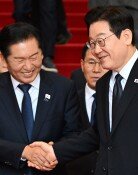Govt to Repeal Unnecessary Biz Penalties
Govt to Repeal Unnecessary Biz Penalties
Posted July. 25, 2008 08:53,
Employers will not be punished for their employees illegal acts when they are found to have done enough to prevent offenses at workplaces.
Business owners who violate some 151 administrative regulations, such as failing to put up signs for construction permit, will face correctional fines, rather than prison terms and fines, while those who break light regulations, such as delay in reporting of business address changes, will be given a chance to voluntarily redress the violation before facing administrative restrictions such as business suspension.
In addition, overdue interest of some 720,000 credit delinquents will be gradually written off.
At a plenary meeting of the fifth Presidential Council on National Competitiveness presided over by President Lee Myung-bak Thursday, Sakong Il, chairman of the council, announced these plans that aim to ease burdens of businesses and help credit delinquents recover their financial health.
As part of the effort, the government will first revamp laws and regulations that act as a ball and chain on businesses and produce massive offenders.
On the dual penalty system, under which employers are accountable for employees illegalities, changes will be made so that if employers have fulfilled their duty of supervision, they can be exempt from criminal punishment. Even when they are found to have failed to do their duties, they will not face jail terms. In addition, business owners will not be responsible for employees illegalities that are not related to work.
Businesses that are found acting in contravention of light administrative rules will be punished by correctional fines, instead of being given administrative penalties.
Judging that subjecting companies to excessive suspension of operation and fines has resulted in a maximum social loss of 600 billion won annually, the government has decided to issue correction orders to businesses to voluntarily redress light illegalities.
In a bid to help those who are in arrears recover their financial health, beginning September, the government will implement the first-step measure. Under the measure, the government will write off all overdue interest of some 460,000 credit defaulters, who have less than 10 million won in arrears, by buying off their bonds. As a second step, 260,000 delinquents with 10 million to 30 million won in arrears will be subject to a debt readjustment scheme.
In an attempt to help financial companies secure enough funds, finance-related rules will be also substantially eased. As a result, financial firms will be allowed to issue various bonds including Covered Bond backed by loan bonds.
For the smooth implementation of these measures, the government and the ruling Grand National Party will push to revise and enact some 430 laws at the regular National Assembly session in September.
President Lee said at the meeting on the day, From now on, I will keep a low profile but I will do what I must do no matter what. There is no change in my conviction that raising national competitiveness is a way to go in this difficult economic situation. Lee also added, Against all odds, I will eliminate unnecessary regulations within my term in office and keep the nations business environment in line with global standards.
ddr@donga.com





![트럼프의 그린란드 병합 의지, ‘이 사람’이 불씨 지폈다[지금, 이 사람]](https://dimg.donga.com/c/138/175/90/1/wps/NEWS/IMAGE/2026/01/20/133193287.1.jpg)

